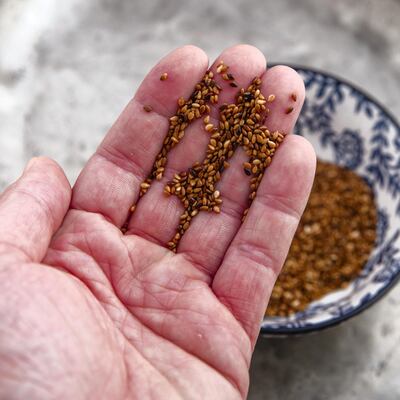Food allergies are on the rise in the UAE because of what doctors have called the “over-hygienic environment”, with sesame seeds becoming one of the most common triggers.
While food allergies were more commonly thought of as a problem found in developed countries, they have become more of a concern in the UAE as the country develops and there is more awareness of the issue.
Sesame, a common food used in Middle Eastern cooking, and other seeds and nuts are among the newer causes of what one doctor called a “concerning rise” in the number of allergic reactions among children and young people.
“In the past, we used to think food allergies were just in western countries, but this is not applicable any more,” said Dr Hamad Alhameli, consultant of paediatric and adolescent medicine and an allergy consultant at Sheikh Khalifa Medical City.
“What we are seeing in the UAE is of major concern and is different to the problem in the West. We share some common allergies, such as cow’s milk, but what we are seeing here is an increase in the number of tree nut and seed allergies, which are beginning to pose a threat to health.”
There are many theories as to why allergies are on the rise, but Dr Alhameli said that he supports the “hygiene theory”, which proposes that modern cleanliness means that children are no longer exposed to enough germs on a day-to-day basis for their immune systems to develop.
He estimates that at least 10 per cent of the population are suffering from food allergies, which can be in reaction to a raw food or to products containing a modified form of a food, such as tahini (a paste made from sesame).
Maitha Al Mesabi, 3, Emirati, had her first allergic reaction when she was just five months old.
“Her cousin had some sweets that contained sesame seeds in his hand and he touched her,” said mother Afrah Saleh, 32, also from the UAE. Immediately after, Maitha began to vomit and her body swelled up.

She was rushed to the nearest emergency department and a series of tests revealed a number of food allergies.
“Eggs, nuts, legumes, cocoa, rice, milk – she can’t eat anything at all and we are too scared to have her eat anything prepared outside of the home,” said Ms Saleh.
She now carries an EpiPen owing to the risk of Maitha suffering a severe allergic reaction that could lead to anaphylactic shock. The toddler is admitted to hospital at least four times a month because of her allergies.
The family live in a “state of contestant panic”, said Ms Saleh, with even a simple touch from another person who has been eating chocolate or candy enough to have disastrous consequences.
“No one else in the family has ever had any form of allergy,” she said. “I can’t imagine what will happen when she starts nursery.”
The top allergen in the UAE, according Dr Alhameli, remains as cow’s milk, followed by eggs and wheat, with rising problems caused by tree nuts such as cashews – which are found in many Indian cuisines – pistachios, hazelnuts and walnuts.
His advice to parents is to test their kids for allergies if they are in doubt. “But don’t panic and exaggerate the symptoms,” he said.
“Allergy tests should not be done without any clinical symptoms,” he said.







